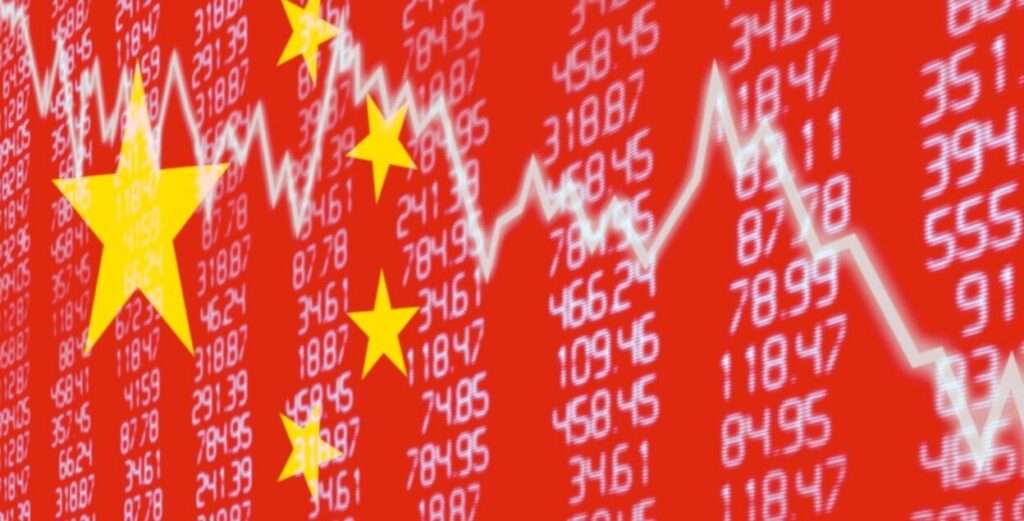The best fund managers in the world, such as Michael Burry, have been increasing their holdings of China stocks in Q1 2024.
Does this signal that China’s economic recovery should be near?
Does it mean China stocks like Alibaba (BABA), JD.com (JD) and Baidu.com (BIDU) etc can finally recover after years of downtrend?
Should you buy China stocks now? Let’s take a further dive in this article.

China’s Historical Economic Performance
China is the world’s 2nd largest economy after the United States.
When it opened up its economy in 1978 alongside the introduction of market-oriented reforms, it recorded an average annual GDP growth rate of around 10% for three decades.
The major forces that kickstarted China’s growth engine had been: significant growth in industrial production, export-led manufacturing and heavy government spending which spurred infrastructure development at a massive scale.
However, a largely debt-fueled environment is not sustainable forever.
Since 2018, China’s economic performance has been lackluster, with annual average GDP growth slowing down to around 5% as of Q1 2024 (half of what it used to be).
China’s GDP Growth across decades:

Source: National Bureau of Statistics of China
Its real estate market, once a thriving sector that accounts for 30% of China’s GDP, has now become its economic Achilles’ heel.
While debt had been instrumental in to fueling China’s rapid growth for decades, excessive leverage by property developers eventually led to a crash in the Chinese housing market.
The most high profile case is that of Evergrande’s. The world’s most indebted property developer defaulted on $US300 billion of its debt in 2021, sparking a nationwide real estate crisis that is still ongoing.
Many other real estate firms have also gone into bankruptcy within the same period.
As of Q1 2024, home prices in China remained weak which negatively impacted household wealth and curtailed consumer spending.
The zero-COVID policy implemented in early 2020 during the COVID-19 pandemic also caused a dramatic decline in economic growth, as massive lockdowns across the whole nation stalled its domestic economy and disrupted international trade activities.
After the Chinese economy reopened in 2023, economic growth continues to be sluggish amidst a declining real estate market.
The country’s also dealing with a debt issue on a national level. China’s debt-to-GDP ratio recorded a new high of 288% in 2023, with gross external debt totaling $2.38 trillion.
Additionally, structural challenges such as a slowdown in labor force growth and declining productivity, also present roadblocks for future development of Asia’s largest economy.

China’s Stock Market Performance
China’s stock market performance has been depressed for several years due to the significant decline in its domestic economy.
Performance of Shanghai Composite Index – consists of more than 1600 stocks that trade on the Shanghai Stock Exchange:

Performance of Hang Seng Index (HSI) – consists of the largest companies in the Hong Kong stock market:

Performance of iShares China Large-Cap ETF (FXI) – consists of large-cap Chinese stocks that trade on the Hong Kong Stock Exchange:

It can be observed that all these charts (each representing a diverse range of Chinese companies) recorded their peaks many years ago, and none of them have been able to recover anywhere close to their all-time-high.
Performance of KraneShares CSI China Internet ETF (KWEB):

The KWEB ETF includes only internet-focused companies based in China.
Its has a more recent peak formation (in 2021) due to the rapid growth of technological innovation across the past few years.
However, the market has crumbled dramatically by more than 70% since then, caused by a brutal crackdown by the Chinese government on tech companies, which wiped out trillions of dollars in market value from Chinese tech firms.
In 2023, Tencent Holdings was fined $410 million by the People’s Bank of China for regulatory breaches.
During the same year, Ant Group – a fintech company founded by Jack Ma (Alibaba Group’s co-founder), was slapped with a $1 billion fine by Chinese authorities.
There were also fears that several Chinese companies (including the Big Tech companies such as Alibaba, JD.com, and Baidu) risk being delisted from US stock exchanges, if they did not comply with the US authorities by handing over the audits of their financial statements.
All these regulatory issues sparked panic among investors, causing them to frantically pull out their money from Chinese tech firms.
As a result, most large-cap Chinese stocks have plunged by more than 50% from their highs.

Investors are Buying China Stocks
A popular saying by Warren Buffett teaches us that we should buy the fear, and sell the optimism.
Chinese stocks have been severely punished across the past few years – does this excessive pessimism means the worst is over?
Has the market bottomed out already?
While overall sentiment on Chinese companies remained largely bearish, several prominent fund managers have started piling their money into Chinese stocks recently.

For example, in Q1 2024, Michael Burry (the founder of Scion Management which rose to fame after successfully shorting the US housing market during 2007-2008), bought an additional 160,000 shares of JD.com while also increasing his stake in Alibaba with 50,000 new shares.
His 2 largest holdings, JD.com and Alibaba, account for 11.84% and 10.32% of his total portfolio respectively.
He also added a new Chinese stock position by investing in Baidu.
David Tepper (founder of Appaloosa Management) increased his holdings in Alibaba (BABA) by 6.9 million shares and Pinduoduo Holdings (PDD) by 1.325 million shares.
He also added new positions in several other Chinese assets – iShares China Large-Cap ETF (FXI), KraneShares CSI China Internet ETF (KWEB) and JD.com (JD).
The largest position in his portfolio is Alibaba, which accounts for 12.05% ($831 million worth) of his total portfolio.
Additionally, Saudi Arabia’s Public Investment Fund (PIF) also bought 153,500 new shares in Alibaba during Q1 2024, increasing its stake in the company by 11%.
Ray Dalio, a long-time investor in Chinese stocks, are still confident in his holdings of Chinese stocks, stating that the best time to buy is when everyone hates the market and that the valuation is still cheap.
Chinese Tech Stocks Performance
Overall, the financial performance of Chinese companies at large have been improving significantly since end-2023.
Despite the rebound, valuations of Chinese technology firms are still much cheaper compared to their US technology peers (Nasdaq 100 has a PE of 23x).
Alibaba beat revenue forecasts in Q1 2024 but missed earnings expectations due to investment losses.
It has a low forward PE of around 10x.
Looking at Alibaba’s chart, the stock seems to have broken out of its accumulation range in May, and is now currently hovering around its support (which was previously resistance).

JD.com performed better in Q1 2024, beating both revenue and earnings forecasts.
It also has a low forward PE of around 10x.
Looking at JD.com’s chart, the stock broke out of the neckline of the inverse heads-and-shoulders pattern in May, and is now currently testing the neckline as support (which was previously resistance).

China’s Economy Moving Forward

There have been fundamental improvements in several areas within the Chinese economy, which provided a beacon of hope for investors.
According to the National Bureau of Statistics of China, retail sales remain weak, rising from 2.3% in April 2024 from a year ago.
This figure fell short of analyst expectations of 3.8% and also underperformed March’s rate of 3.1%.
The weak consumer segment is explained largely by the sustained slump in the Chinese housing market across the past 3 years, which continued to weigh on China’s domestic growth.
However, industrial production has improved significantly, rising by 6.7% in April 2024 compared to a year ago. This beats the forecasted 5.5% and March’s rate of 4.5%.
New stimulus measures by the Chinese government, such as the establishment of a long-term bond financing program to spur new developments, has also helped to improve investor confidence in the country.
Starting from May 2024 onwards, China will be selling 1 trillion yuan in long-term bonds to support its economic initiatives by channeling fresh funds into major projects.
The Beijing government has also intervened to rescue its property sector by removing the floor on mortgage rates while reducing the down payment required for home purchases.
Additionally, the People Bank of China pledged to provide $42 billion of funding to buy vacant properties.
These positive news have increased inflows into China stocks, driving their ascent from their bottoms.
Goldman Sachs analysts have an optimistic outlook on the potential of the Chinese stock market, with overweight ratings assigned to the technology, media and telecommunications sectors.
Nonetheless, success depends on how well the new policy measures are able to revive the property market and bolster consumer spending.
On the international front, the ongoing geopolitical tensions between US and China continue on as headwinds, causing China’s export growth to slow down significantly.
In May 2024, the Biden administration imposed a 100% tariff on all Chinese electric vehicles, as well as tariffs on supporting parts such as semiconductors and lithium batteries.
As part of its dedollarization efforts, China has been dumping US government bonds to diversify away from the US dollar in international trade.
In Q1 2024 alone, a record $53.3 billion worth of US Treasuries and agency bonds have been unloaded.
Another reason for the huge sale of dollar-denominated assets is to prop up the value of the Chinese Yuan, which has been weakening against the strong US dollar amid US’s protectionist policies and high US interest rates.
During the same period, China has been accumulating gold in large purchases, with gold constituting 4.9% of the country’s total reserves as of May 2024. This is a record high since 2015.
To understand more about whether you should invest in gold, read this article on gold investment.
Should you invest in China stocks?
So should you follow the actions of smart money and invest in China stocks now, given that they are on the rebound?
There are both positive signs as well as ongoing headwinds that you should consider.
Ultimately, do your own due diligence and diversify your portfolio with different assets to manage your risks!
Pros of investing in China stocks:
- Improvement in economic fundamentals (a pickup in industrial activities)
- Supportive measures by the Chinese government to inject liquidity into the economy
- Increased inflows by several institutional funds into Chinese stocks
- Technical analysis shows a rebound across several Chinese tech stocks
- The Chinese stock market has been depressed for years, this recent recovery indicates that the worst may be over
Cons of investing in China stocks:
- Housing market slump has been ongoing for 3 years
- Weak consumer spending affects domestic retail sales
- Underlying structural challenges (on the supply side) may hinder growth
- Ongoing US-China tensions lead to poor international trade relations that affect Chinese exports
✅ Interested to invest in Chinese stocks listed on US stock exchanges (eg. Alibaba, JD.com, Tencent)? Buy them here!
Open your FSMOne USD Savings & Investment Account
🚨 Hold on… there are many other better investment opportunities with more attractive returns potential.
Interested to check them out? Click Here to Join The Investors Club.

✅ Want to discover Buy&Sell Stock Ideas & get the latest Market Insights from Professional Analysts globally?
Join Seeking Alpha premium investing club (20% off annual membership!)

– Useful Links –
✅ Sign up to TheFinancialFuse newsletter for Market News, Finance Insights & Investment Analysis:
Join TheFinancialFuse newsletter community
✅ Retire Early with My Rich Future’s Financial Budgeting Toolkit
Your Retirement Planning, Budgeting & Portfolio Management Toolkit
✅ Become a Professional Investor – Stock Investment Mastery Course:
Learn to Invest like a Professional Analyst | Fundamental Analysis, Charting Analysis & Portfolio Strategies
✅ How to Get Rich with Megatrends ebook (list of 30+ stocks):
Build a Winning Investment Portfolio with Trending Stocks of the Decade
✅ Open a Brokerage Account – Invest in Global Stocks, ETFs, Unit Trusts & more:
Open your FSMOne USD Savings & Investment Account
✅ Become a Crypto Investor & Trader – Cryptocurrency Mastery Course:
Learn to Make Money with Crypto | Blockchain Analysis, Charting Analysis & Portfolio Strategies
✅ Master Trading with The Trader’s Guide Ebook
Learn to be a Better Trader with Price Action Strategies
✅ Discover the Best Stock Ideas from Professional Analysts (20% off annual membership!):
Join Seeking Alpha premium investing club
Disclaimer: All the information provided in www.thefinancialfuse.com is for educational purposes only and should not be considered financial advice, thus the author(s) of this website are not responsible for any investment decision that you make. You are encouraged to do your own research and due diligence.



